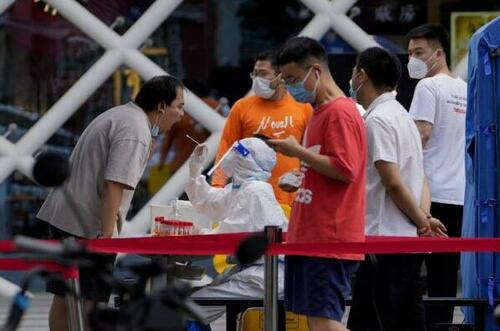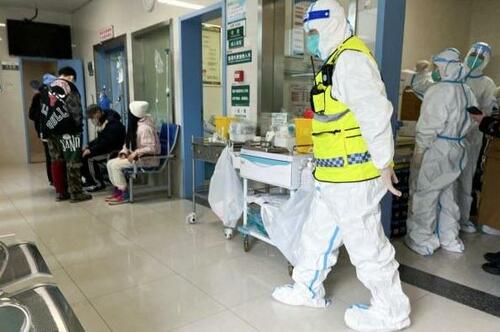by Alex Wu via The Epoch Times,
China has resumed COVID-19 PCR testing in Beijing and Shandong Province amid rising re-infections, while the regime’s top health advisers have warned of a new wave of mass infections
Since May 29, mainland netizens have posted on Chinese social media platforms that PCR test kiosks in Beijing are quietly back in business.
Mainland media “City Interactive,” a subsidiary of Zhejiang “City Express,” reported on May 30 that one of the PCR testing booths that netizens posted about was in Beijing’s Xicheng District, where the central government and the Beijing municipal government are located.
The staff of that testing kiosk said that the PCR test there has never stopped, reported “City Interactive”, without being clear how long it had been open.
“We have been doing nucleic acid testing in Xicheng District, but I’m not sure about other districts in Beijing,” a staff member said.
The staff member said the laboratory she works for is mainly responsible for nucleic acid testing within Xicheng District. Currently, there are more than ten testing points outdoors, and one person is on duty for each booth from 9:00 am to 5:00 pm.

Residents get swabbed during mass COVID-19 testing in the Chaoyang District in Beijing on June 14, 2022. (Andy Wong/AP Photo)
A testing kiosk in Chaoyang District, Beijing’s central business district, has been operating since March, reported “City Interactive.” The testing booth staff said it is in the health center near Jinsong Middle Street.
Ms. Wang, a Beijing resident, told The Epoch Times on May 28 that some people have taken the PRC test while others have chosen not to.
She said many people around her, including her child, have already re-infected twice.
“This time, the symptoms seem to include a high fever and then sore throat, very painful,” she said.
“Most people are just resting at home now. Seeing a doctor is very expensive, and now many medicines are paid for by ourselves.”
Gao Yu, a former senior media person in Beijing, confirmed what Wang said. She told The Epoch Times that the relatives around her have been re-infected two or three times, and most are just resting it off at home.
Shandong Resumes Testing
PCR testing booths in Qingdao City, Shandong Province, have also reopened.
A “Peninsula Metropolis Daily” report included a screenshot of an online notice posted by the Laoshan District Health Bureau in Qingdao, which announced that from May 29, the district will conduct COVID-19 PCR testing for “all people who are willing.”
It also listed the working hours of the testing sites, from 7:00 am to 4:00 pm, seven days a week.
Another mainland Chinese media, “Xinmin Evening News,” reported on May 31 that the staff in the district bureau confirmed that the testing has resumed and is for free.
Next Wave
Zhong Nanshan, China’s top respiratory disease specialist, predicted on May 22 that a new wave of COVID-19 infections in China will likely peak in late June when weekly cases could reach 65 million. Then, one Omicron-infected patient will be able to infect more than 30 people, Zhong said, adding that the infection is difficult to prevent.

A security personnel in a protective suit keeps watch as medical workers attend to patients at the fever department of Tongji Hospital, a major facility for COVID-19 patients in Wuhan, Hubei Province, China, Jan. 1, 2023. (Staff/Reuters)
Chinese citizens across the country have said on social media that infections have been swelling since March.
Zhong also said there had been a small peak in infections at the end of April and early May.
Most COVID-19 infections in mainland China are currently caused by the XBB series mutant strains of Omicron. Among the locally transmitted cases, the percentage of XBB series variants increased to 83.6 percent in early May from 0.2 percent in February.
Zhang Wenhong, China’s top virologist and director of China’s National Center for Infectious Diseases, also warned in late April at a conference that COVID-19 infections would reoccur after six months when immunity gained from prior infections has worn out.
https://www.zerohedge.com/covid-19/covid-19-testing-resumes-beijing-shandong-reinfection-cases-surge

